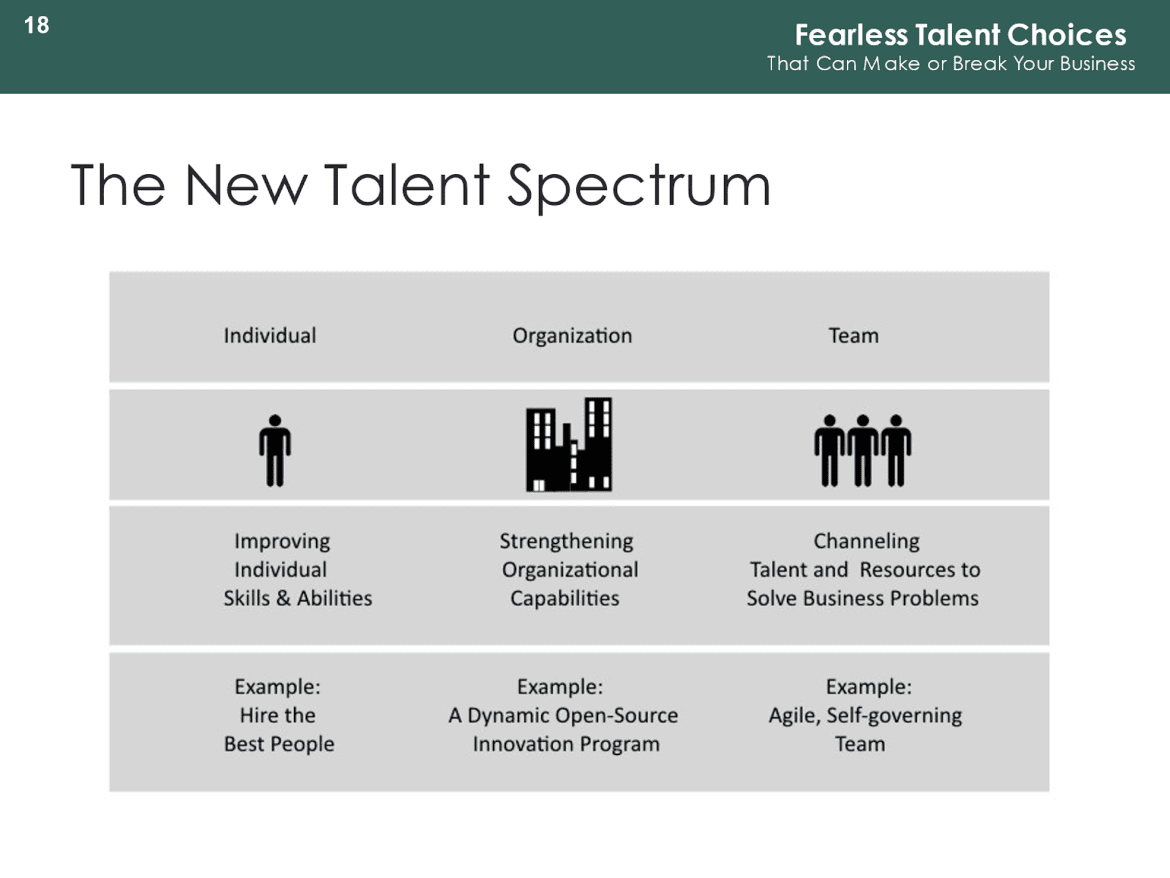

By David C Forman, bestselling author “Fearless Talent Choices”
WHY SHOULD YOU CARE?
“Not finance. Not strategy. Not technology. It is teamwork that remains the ultimate competitive advantage , both because it is so powerful and rare.”
Patrick Lencioni
“Communities outperform bureaucracies every day of the week” Gary Hamel
“Never underestimate the power of a small, dedicated group of people to change the world. Indeed, it is the only thing that ever has.” Margaret Mead
“Companies almost universally miss the importance of teams, as evidenced by the fact that most companies don’t even know how many teams they have at any one moment and who is on them, let alone which are the best ones—we are functionally blind to teams.” Marcus Buckingham and Ashley Goodale
“Not finance. Not strategy. Not technology. It is teamwork that remains the ultimate competitive advantage , both because it is so powerful and rare.” Patrick Lencioni
“Businesses will be increasingly organized around distributed teams, remote workers and dynamic collectives with a continuous exchange of data and ideas.” Klaus Schwab
Sometimes the business world is slow to catch on, but work is now a team sport. Today, more than 80% of the work done in mid to large sized organizations is accomplished in teams. These teams have a common goal, are usually comprised of four to nine members, and: are business and customer focused, enable contribution by all, built for experimentation, embrace transparency, and change as fast as the world around them. While teams are now in the ascendency, it has not always been this way.
For many years, organizations focused on hiring and retaining the best and brightest individuals. This approach was advocated in McKinsey’s groundbreaking “The War for Talent” (2001) twenty years ago. There were some early dissenters about focusing primarily on top talent, (e.g., Malcolm Gladwell), but most people believed this made sense: Bring in a bunch of really smart people, surround them with traditional talent management practices, and the organization will prosper.
This approach seemed to work, but then warning signs emerged. There were seismic failures of organizations comprised of very smart but dysfunctional people. There is also now a growing recognition that ‘the way we have been working, isn’t working’ in this world of constant change, interconnectedness, and hazy futures. Among the problems: productivity is declining, once-successful management models are now barriers, people are demanding more flexibility, and organizations are not changing as fast as the world around them.
Dave Ulrich read these tea leaves with his book Victory through Organization—Why the War for Talent is Failing Your Company (2017). His view—backed by research—is that by improving the workplace, the workforce can flourish. It is about building organizational capabilities to improve innovation, enhance collaboration, reduce bureaucratic barriers, and open participation for all. Ulrich’s research showed that by focusing on these organizational capabilities and strengthening how people worked together, the return is four times greater than just focusing on top individual talent.
But building organizational capabilities does not translate into building big organizations. Large organizations have their own set of problems, including becoming too big, layered, regulation-bound, and cumbersome. Hamel and Zanini (2020) have analyzed the initial decades of the Twenty First century and make a strong case for more agile, adaptive, and dexterous organizations. A truly resilient organization, they belief, is characterized by:
- Rushing out to meet the future.
- Changing before it had to.
- Redefining customer experiences continually.
- Capturing more than a fair share of opportunities.
- Never experiencing an unanticipated earnings shock.
- Growing faster than rivals.
- Having an advantage in attracting talent.
Increasingly, these resilient organizations are small, flexible, responsive teams. This shift from how talent has been perceived is represented in Figure 1. These stages are not absolute, but they do depict a change in perspective that is reflective of a fast changing world and the need to respond to world and economic conditions quickly.

Three Ingredients for Successful Teams: Trust, Collaboration, and Accountability
A team is not simply a collection of people. To be effective, a team needs to develop its own purpose, identify, working relationships, and culture. In addition, there are three qualities that successful teams exhibit.
- Trust. All great teams have team members that trust each other. If not, the team can quickly dissolve into competing factions or worse yet, silent acquiescence. Trust can be operationalized in different ways. Most measures of trust include indicators such as communicating honestly, keeps the best interest of others in mind, respects the contributions of each person, follows through on commitments, and openly admits mistakes. An interesting fact is that when trusting relationships exist, our bodies sense this and produce more Oxytocin, which, in turns triggers a reciprocal act (Zak, 2017). Our bodies, then, are chemically impacted when we trust other individuals, and this trust begets more trust.
- Collaboration. As we have seen, it is not enough for team members to be connected, they must function together effectively. Open and honest communications must occur, and the team must become a smooth, functioning unit that builds on the work and accomplishments of its members. The concept of ‘psychological safety’ (Edmondson, 2019) is critical to both establishing trust and effective collaboration. It asserts that team members respect the opinion of others, provide equal opportunities to participate and feel safe to express different perspectives and viewpoints.
“Coming together is a beginning, keeping together is progress; working together is success.” Henry Ford
- Accountability. Teams exist for a purpose. Examples of such purposes are: New product launches, bureaucratic barriers erased, supply chains working more smoothly, costs reduced, or new opportunities explored. In high performing teams, team members hold each other accountable for making progress and achieving results. The power of colleagues committing to each other is an extremely strong motivator, often even stronger than a commitment made to a supervisor. With accountability in place, teams can become self-governing. Without accountability, teams are little more than a group exercise.
When these qualities are present, the results can be amazing. While so often organizations are not greater than the sum of their parts; when teams are synchronized and supported the exact opposite can occur. Buckingham and Goodale have studied high performing teams around the world, and at Cisco they used a tool that identified eight questions about the ‘best of me’ and the ‘best of we.’ Their findings:
“At Cisco, the best teams harness individual excellence of each team member, unlock the collective excellence of the team, and do so in an environment of safety and trust.” Marcus Buckingham and Ashley Goodale, 2019
One last refrain about the power and magic of memorable teams. Google wanted to understand what distinguishes their best teams from competent ones. Project Aristotle studied this question and many thought that it had to do with the intellectual prowess of team members: Get a bunch of smart people and let them solve the problem (sound familiar). It turns out that this was not the case at all; it is less about who is on the team than how the team works together, collaborates, and the fact that members hold each other accountable for driving results.
These findings seem to be relevant to different types of teams. In the world of American football, there have only been 9 players who have won the Most Valuable Player award and been on a super bowl championship team in the same year; and no one has accomplished this feat yet in the 21st Century. Success, then, is not achieved by having the best individuals but the best team. Great players get noticed and written about; teams win championships.
Meet the author at the upcoming Talent@Work Forum
Written by: Dave Forman
Future of Work HR Strategy Teamwork
Previous post

- 1512
labelPartner Content today2022.04.03.
Leading@Work – Reimagining Leadership and Coaching for results
Underwriter: International Coaching Federation Watch the forum on demand. Recorded on 31st March, 2022. The HR Congress Forum presents:Leading@Work – Reimagining Leadership and Coaching for results The pandemic brought unforeseen [...]
Similar posts

labelArticles today2024.07.24.
AI-Powered HR: Strategic Benefits and Practical Applications

labelArticles today2024.06.24.









Post comments (0)